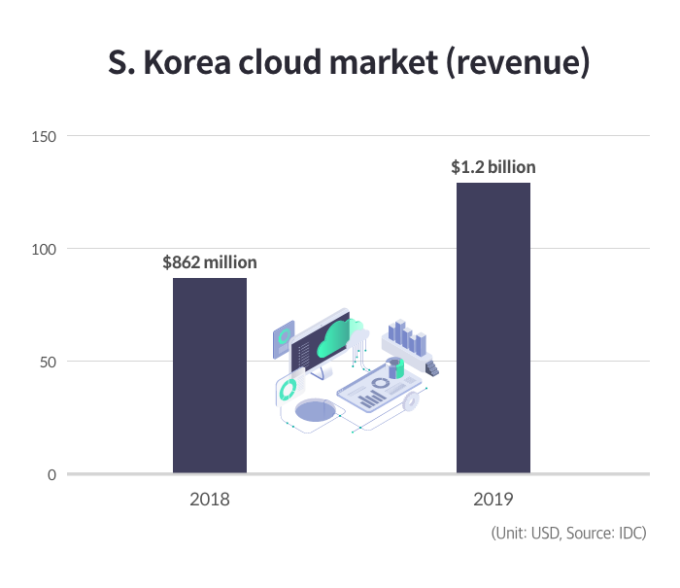SAP joins growing competition in S. Korea's cloud market
By Nov 05, 2020 (Gmt+09:00)
LG Chem to sell water filter business to Glenwood PE for $692 million


Kyobo Life poised to buy Japan’s SBI Group-owned savings bank


KT&G eyes overseas M&A after rejecting activist fund's offer


StockX in merger talks with Naver’s online reseller Kream


Mirae Asset to be named Korea Post’s core real estate fund operator


During a media roundtable on Nov. 4, SAP Korea announced that it will provide solutions for cloud platforms, analytics cloud, high-performance analytics appliance (HANA) alongside the business technology platform (BTP), a portfolio of integrated solutions, to Korean companies through a local data center.
Until now, Korean companies that used SAP software-as-a-service (SaaS) had to go through the SAP data center in Japan.
“Setting up a data center in Korea will make it easier to convince clients to shift over to our cloud system while also satisfying the government’s request to keep industrial secrets and the public's private data within the country,” said an SAP Korea official.
SAP Korea's data center will be created by deploying its system, using the data center infrastructure such as the cloud infrastructure-as-a-service (IaaS) built by Amazon Web Services.

SAP's construction of a Korea-based data center is seen as a strategic move to encourage domestic clients to adopt SAP solutions in their core operations.
In particular, it will meet the requests of domestic companies that have been reluctant to have private data transferred outside of the country and opted to process key data through their own servers instead of SAP's cloud.The company's core business is a cloud-based enterprise resource planning (ERP) system that boasts around 450,000 clients. SAP forayed into Korea in 1995 and has since steadily increased its client base, particularly after launching SAP HANA, an application that allows high-speed processing of massive amounts of real-time data.
Lee Sung-youl, the chief executive of SAP Korea, said: “Many large companies in Korea, including Hyundai Motor Group, are our clients.”
SOUTH KOREA'S CLOUD MARKET SEES SHARP GROWTH
SAP says that Korea’s cloud market has huge potential, given its sharp growth in the past few years. According to market research firm IDC, the size of the domestic cloud market increased by 33.7% to 1.3 trillion won ($1.2 billion) last year from 973.1 billion won ($862 million) in 2018.
Industry watchers expect the uptrend to continue, given that an increasing number of companies are undergoing digital transformation amid the global coronavirus pandemic.

Many domestic and foreign cloud companies have been ramping up their operations in Korea by building data centers and expanding cloud capacity.
Korea’s portal giant Naver plans to build its second data center by 2022 and the country’s largest mobile messaging app operator Kakao is also set to construct its first data center by 2023.
Riding on the increased demand for cloud solutions, AWS also recently expanded its Seoul-based data center’s capacity. Microsoft, which operates data centers in Seoul and Busan, recently shared plans to build an additional data center in Busan.
Write to Han-jong Choi and Joo-wan Kim at onebell@hankyung.com
Danbee Lee edited this article.
-
 Business & PoliticsTrump Jr. meets Korean business chiefs in back-to-back sessions
Business & PoliticsTrump Jr. meets Korean business chiefs in back-to-back sessionsApr 30, 2025 (Gmt+09:00)
-
 Korean chipmakersSamsung in talks to supply customized HBM4 to Nvidia, Broadcom, Google
Korean chipmakersSamsung in talks to supply customized HBM4 to Nvidia, Broadcom, GoogleApr 30, 2025 (Gmt+09:00)
-
 EnergyLS Cable breaks ground on $681 mn underwater cable plant in Chesapeake
EnergyLS Cable breaks ground on $681 mn underwater cable plant in ChesapeakeApr 29, 2025 (Gmt+09:00)
-
 Business & PoliticsUS tariffs add risk premium to dollar assets: Maurice Obstfeld
Business & PoliticsUS tariffs add risk premium to dollar assets: Maurice ObstfeldApr 29, 2025 (Gmt+09:00)
-



